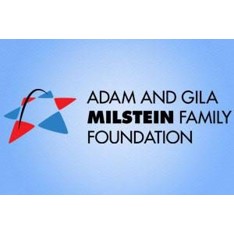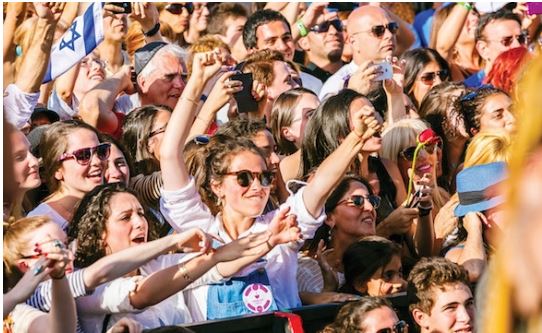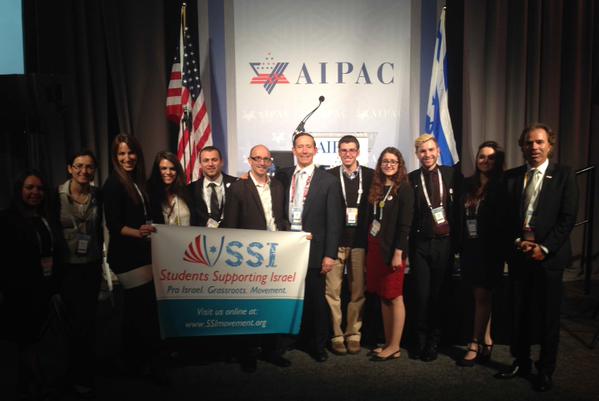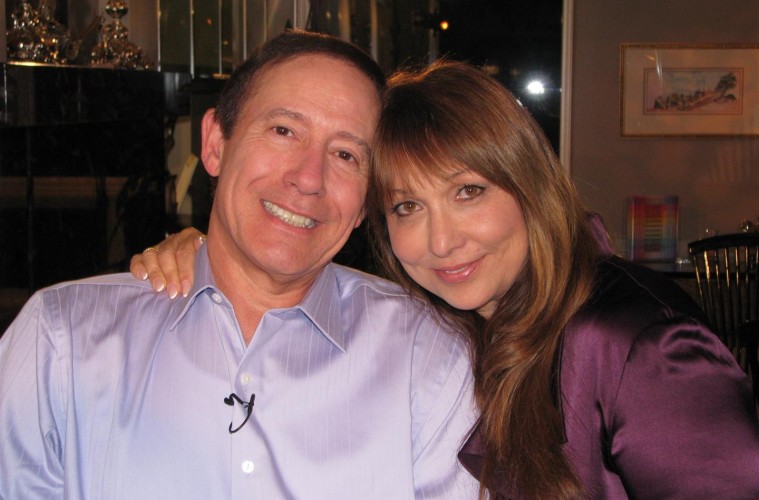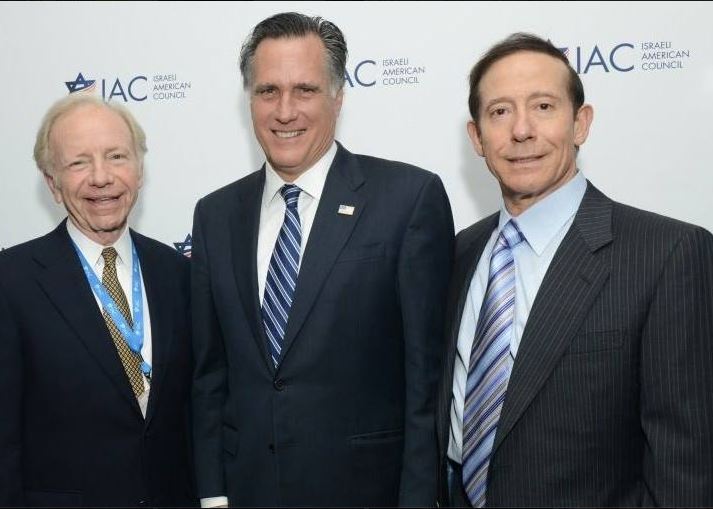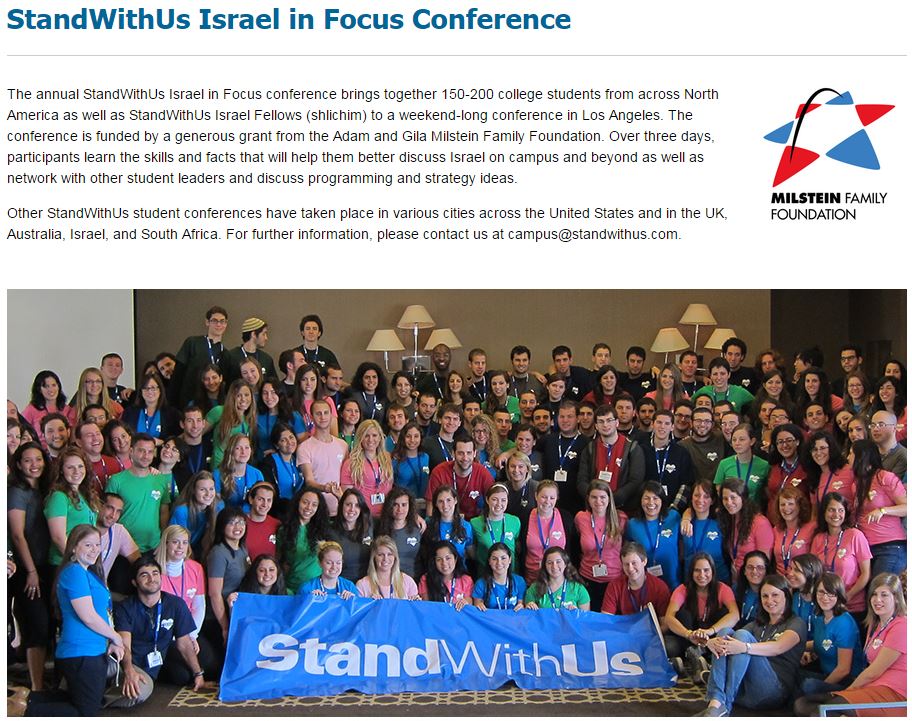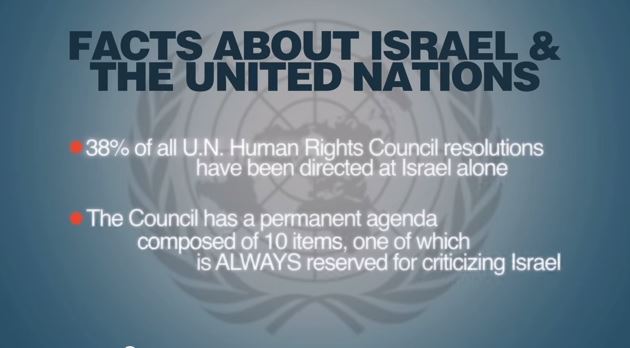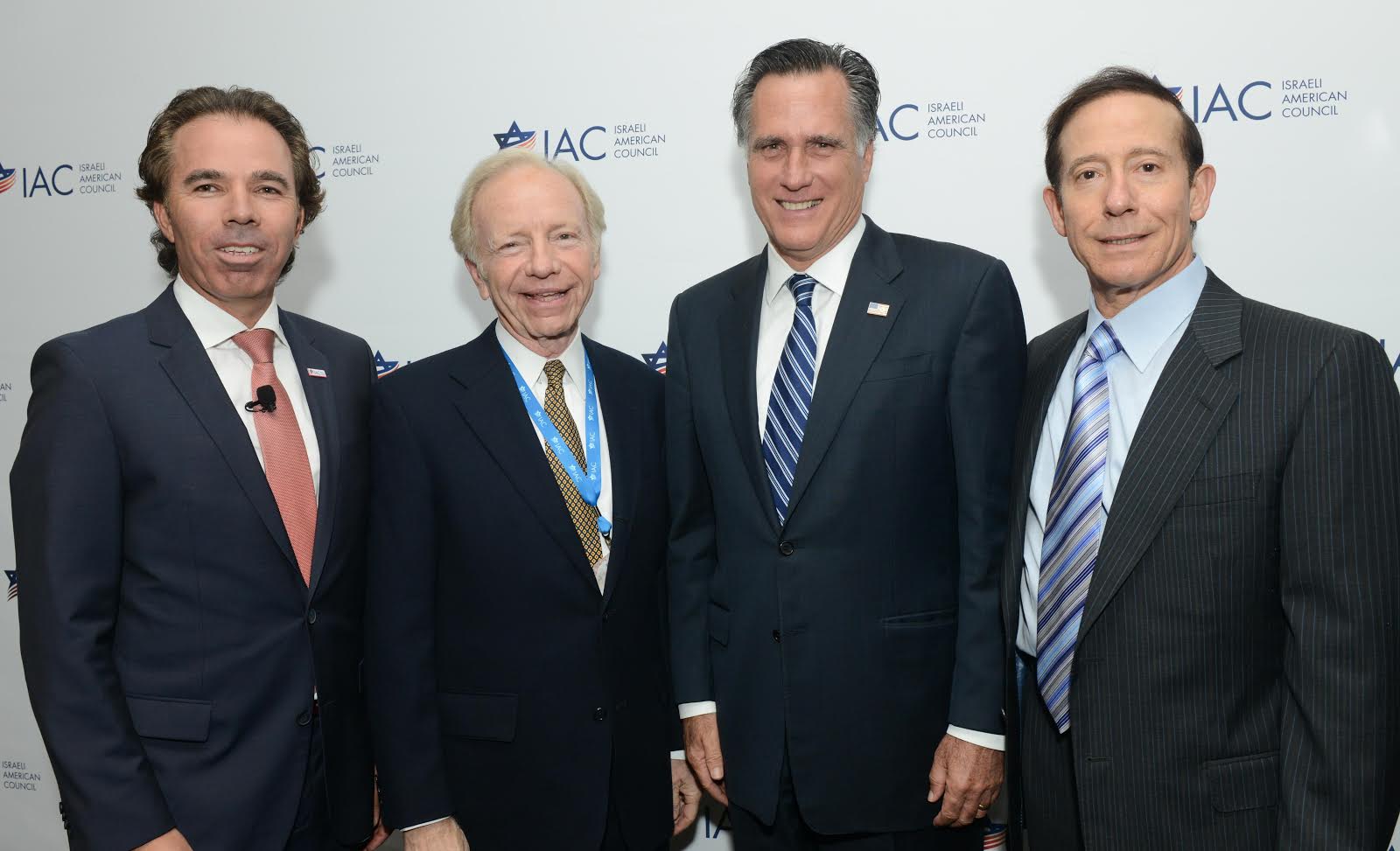by Jared Sichel
A crowd of about 10,000 gathered in Rancho Park for the 2014 Celebrate Israel Festival. Photo by Abraham Joseph Pal
Last November, a group of ambitious Israeli-Americans captured the inside-the-Beltway limelight for a weekend with a large, flashy conference at the Washington Hilton. Among the highlights were billionaire businessmen and political donors Sheldon Adelson, a Republican, and Haim Saban, a Democrat — who had an animated, moderated onstage discussion — as well as appearances by former Republican presidential nominee Mitt Romney, and Sens. Robert Menendez (D-N.J.) and Lindsey Graham (R-S.C.).
The conference was staged by the Israeli-American Council (IAC), which formed eight years ago in its home city of Los Angeles and has an expanding nationwide presence. Its conference served, in part, to brand and highlight the existence in the United States of an Israeli-American community that has a unique character, unique needs and unique ties to Israel. The conference, which often felt more like a party, sent a message to its 800 guests, as well as to the scores of Jewish- and Israeli-Americans who heard about it: The IAC is a serious, driven and very, very well-funded force on the Jewish and pro-Israel stage in America.
And it’s growing at a startlingly rapid clip.
Israelis have been immigrating to the U.S. since shortly after Israel’s founding in 1948, but for decades, even as tens of thousands of them have become financially successful businessmen, lawyers, professors, doctors and more — particularly in Los Angeles, New York and Miami — there remained a nagging sense of cultural discomfort: Can they call America home when many of them long for Israel? Can they call Israel home while living in the Diaspora?
“We don’t feel [100 percent] American,” Adam Milstein, managing partner of Hager Pacific Properties, said in an interview last month at his Encino office. “I think we’re also different than the Israelis living in Israel — they don’t see us as part of them.” He and his wife, Gila, moved to the U.S. in 1980 with their two daughters. Milstein is a real-estate entrepreneur who sits on a number of boards of Jewish and pro-Israel groups; he’s also one of the IAC’s seven co-founders, all of whom were business and community leaders in Los Angeles when they created the group in 2007.
For many reasons — one is the feeling of not being fully American — most Israelis traditionally have not been involved with mainstream Jewish communal organizations in the U.S., particularly the Jewish Federation, the embodiment of the organized, institutionalized American-Jewish community. So in 2007, this group of Israeli businessmen created their own community, growing it in just eight years from one office in the San Fernando Valley to a national organization headquartered in Los Angeles, with six regional offices in L.A., New York, Boston, Miami, New Jersey and Las Vegas, 70 employees and an $18 million budget this year. The IAC’s donors are as wealthy and ideologically diverse as Saban and Adelson (the latter has given well over $10 million), and the group said it reached some 150,000 people in 2014 (a number it touts on its website and supplemental materials). It also is exploring the possibility of opening offices in two more cities — Chicago and Philadelphia — and hopes to soon have influence on Capitol Hill and in multiple state capitals. It already has relationships with U.S. and Israeli government officials, among them Israeli Prime Minister Benjamin Netanyahu and top U.S. lawmakers.
With money, vision, programming and a young, motivated staff, the IAC is redefining for Israelis in America what it means to be an Israeli living in America. In just eight years, it has become the go-to umbrella community organization Israeli-Americans have lacked for 60 years — a group that wants to help Israeli-Americans feel at home while maintaining strong ties to the Jewish state. It also helps them to feel at peace with having left Israel — some Israeli and American Jews still see that as betraying the Zionist vision — by acting here as citizen “ambassadors” for Israel.
Among the IAC’s activities is providing Israeli-American children with Hebrew-language kids’ books; running Israeli cultural and Hebrew-language programs for teens, college students, young adults, parents and senior citizens; organizing annual large-scale Celebrate Israel festivals in all of its regional centers, such as the one taking place May 17 in Los Angeles’ Rancho Park; and funding dozens of Israeli culture and Hebrew-language programs across the country.
One of the major aims of all this money and programming is to help Israelis resist the pressures of assimilation not only on themselves, but also on their children and grandchildren. For example, the IAC’s outgoing CEO, Sagi Balasha, 42, who will soon return to Israel with his wife and two children, said that in the four years he and his family have lived here, his kids are already “totally Americanized.”
“If you come to my home you’ll see a typical Israeli-American home,” Balasha said, recalling a recent evening when his son, Shahaf, posed a simple question. “Abba, how many presidents did we have?”
“For a second,” Balasha said, “I was like, ‘How many presidents did wehave?’ He feels American. I would ask, ‘How many presidents didAmerica have?’ ”
The mission is to build a strong Israeli-American community, and strengthen the American-Jewish community and the State of Israel.
Of course, this mission faces challenges, as well as some internal quandaries. The group is Israeli, but it’s also American. It wants to re-create some of the best things about Israel here, but not so much so that Israeli immigrants who had planned to return decide they can actually stay Israeli in, say, Tarzana. The group wants to connect with and impact the American-Jewish community, although Israeli-Americans more often like to create their own institutions and avoid membership in ones the American-Jewish community has used for generations.
What drives the IAC?
Two distinct IAC offices occupy one floor of an office building in a cookie-cutter corporate office park in Woodland Hills, in the heart of the San Fernando Valley, where the majority of L.A.’s Israeli-Americans reside. One office houses the organization’s L.A. regional staff, the other its national staff. Both spaces display Hebrew-language magazines and pamphlets on the counters, and pictures of different Israeli cities and of Israeli soldiers on the walls.
The ambience is Israeli-casual — people are dressed in jeans or Dockers and a few of the women wear skirts. Staffers generally speak among themselves in Hebrew, and there are the ever-present sounds of ringing phones and buzzing email alerts. Five of the IAC’s seven founders still serve on its 13-member board. Three are successful real-estate developers — Milstein, Shawn Evenhaim and Naty Saidoff; Danny Alpert owns a jewelry company called Oro Alexander; and Yossi Rabinovitz is the owner of JMR Electronics. As they tell it, in the summer of 2006, around the time of Israel’s war with Hezbollah, then-L.A. Consul General Ehud Danoch encouraged them to create an organization that could unite the large yet uncounted number of Israelis living in Los Angeles to help support Israel, particularly in times of war.
The guiding mission of what was first called the Israeli Leadership Club (ILC) — shortly thereafter becoming the Israeli Leadership Council — quickly expanded to creating a more formally cohesive Israeli-American community that could both nurture and perpetuate a sense of Israeli identity for Israelis and their offspring in America, as well as bridge the gap between Israeli-Americans and the institutions of the Jewish-American community. The reasons behind that gap stem from the days when yordim — those who “descend” as opposed to “ascending” in making aliyah — was still the default characterization for Israeli emigres. As a result, Michigan State University sociologist and Israeli Diaspora expert Steven Gold said, Israeli immigrants were seen as “marginal” to much of the Jewish-American community.
“They weren’t supposed to go abroad [from Israel], so they were kind of embarrassed,” Gold said. “Israel wasn’t supportive of them, and the American-Jewish community, which wanted to help Israel, didn’t reach out a lot.”
Israelis who have lived in the United States for decades remember well when, in a 1976 interview televised in Israel, then-Prime Minister Yitzhak Rabin derisively called Israelis who had left Israel “nefolet shel nemushot”— “fallen weaklings,” people not tough enough to make it in Israel.
Israeli and American-Jewish attitudes toward Israeli emigres changed in the 1990s, following the influx of more than 1 million Jewish immigrants into Israel from the former Soviet Union and Ethiopia, according to author Yossi Klein Halevi, a senior fellow at the Shalom Hartman Institute in Jerusalem. With these new citizens, the “old Israeli anxiety about demographics began to ease,” Halevi said. Israelis who left were suddenly somewhat tolerable to the Israeli psyche, and, over the years, they began to be viewed as potential assets to the Jewish state, as evidenced by Danoch’s request to Israeli expatriates in Los Angeles.
Since its founding, the IAC has had one big factor in its favor: wealthy backers, and lots of them. Its co-founders together are worth many millions of dollars. Saban (net worth $3.5 billion) was an early backer, along with Beny Alagem, the owner of the Beverly Hilton and the Waldorf Astoria in Beverly Hills. Both gave $250,000 at the IAC’s first major fundraiser, in 2008. With the 2013 addition of Adelson (net worth $30 billion), the IAC’s pockets don’t seem to have a bottom.
At its seventh annual Los Angeles gala, which took place March 8 at the Beverly Hilton, the group announced it had raised $23.4 million, including $12 million from Adelson and $1.2 million from Saban. “Sheldon is 10 times richer than me,” Saban quipped to the crowded hall of 1,100 dinner guests, “I said to Sheldon, ‘Listen, whatever you give, I’ll give one-tenth.’ ” Less than one year earlier, in May 2014, Adelson and Saban together contributed $3.5 million of $6.5 million raised at a fundraiser at Milstein’s Encino home for the creation of a Birthright program specifically for Israeli-Americans.
At the March gala, the IAC also announced the purchase of a $10 million property in Winnetka, just east of its current San Fernando Valley offices, which it plans to use as a community center for the Israeli-American community and as the new headquarters of the IAC. The group may also offer office space for other Israeli organizations.
The vision for this community center, although not fully formed, sounds something like an Israeli-American version of a Jewish Federation combined with a traditional Jewish community center — a physical structure open to community professionals, families and individuals. It’s primed to be a major physical and figurative landmark for a community that notoriously “sits on its suitcases,” as Balasha put it.
“People come here with the intention to go back, and that creates a special psychology,” he said of Israeli immigrants. “You will not really try to be part of a Jewish community; you will not try too hard to integrate into American society; you will not spend your money on sending your kids to Jewish day schools, because you’ll just speak Hebrew at home.”
Instead of integrating into mainstream Jewish structures, Israelis in Los Angeles and around the country long have tended to create their own medley of after-school programs, nursery schools, social programs and lecture series, maintaining some mix of both Israeli and Jewish identity independent of traditional American Jewry.
“They were just individuals around this country, and there was nothing that united them — they were not part of any community,” Balasha said. “Until now.”
Preserving what many at the IAC call “Israeliness” is one-third of the IAC’s mission. For all ages, from young children to working professionals and seniors, the IAC runs and funds dozens of programs that are infused with Israeliness.
“To identify with Israel [in America] is a challenge, it’s a struggle, and you need to work a lot,” Balasha said. “You want to celebrate with your kids Halloween and Thanksgiving, but you want for them to feel that Pesach and Sukkot and Chanukah are as much theirs — and Yom HaAtzmaut, maybe more than any other holiday.”
For the IAC’s children’s programming, there’s Sifriyat Pijama B’America, which mails Hebrew children’s books and music to 15,000 Israeli-American homes in the U.S. once a month at no charge, according to the IAC’s chief programming officer, Shanee Feig. In June, the IAC will offer Machane Kachol Lavan, a Hebrew-language sleep-away camp in Running Springs, Calif., and Barryville, N.Y. It will mark the camp’s second year in California and its first on the East Coast.
College students have Mishelanu, which sponsors get-togethers and events on more than 30 campuses nationwide, said Nirit Hinkis, the program’s coordinator for the Southern California and Las Vegas regions. And the IAC’s Tzav 8 is a communication system with about 50,000 phone numbers and email addresses that the group uses to quickly organize rallies and demonstrations to support Israel during crises like the war with Hamas last summer. Balasha said the IAC has used this network four or five times to mobilize rallies, most recently in Los Angeles, New York, Boston and Las Vegas.
There’s also the IAC’s largest and most expensive program, Celebrate Israel, which brings together tens of thousands of American and Israeli-American Jews to celebrate Yom HaAtzmaut, Israel’s Independence Day. About 10,000 Jews (a number the group hopes to increase) have attended the Sunday event each year in Rancho Park, enjoying Israeli food, music, arts and culture on the heavily Jewish Westside of Los Angeles. The IAC’s operating cost for the Los Angeles festival is about $700,000 annually.
This year, Balasha said, a Celebrate Israel festival in Miami on May 3 drew about 9,000 people, and one in Las Vegas on May 10 drew 3,600. The IAC’s regional offices in New York and Boston plan to have simultaneous Celebrate Israel festivals on May 31. Balasha said the group expects its five festivals this year will collectively draw a total of about 50,000 people.
In addition, the IAC also awards grants to dozens of Jewish and Israel-focused organizations and programs, including the Chicago Festival of Israeli Cinema and the Phoenix Israel Center, as well as StandWithUs and Taglit-Birthright Israel.
Having their cake and eating it, too?
“There was one woman who told me, ‘The community is so amazing here that I feel less of a need to go visit Israel,’ ” Dikla Kadosh, regional director of the IAC’s office in Los Angeles, said. Kadosh said she thought at the time, “Oh my God, no, that’s not the intention. We don’t want to re-create Israel so much, so realistically, that people stop going to Israel.”
In Los Angeles, though, Israel doesn’t always feel so distant, particularly because of the climate, the Israeli-style restaurants and the concentration of Israelis in certain neighborhoods, and also because of what the IAC has built.
“Especially as our community strengthens here, there’s a lot less of that guilty feeling of, ‘What am I taking away from my children? What risk am I taking by being here? That my children will not be Jewish, that my children will not speak Hebrew, that my children will not have a connection to Israel,’ ” said Kadosh, who was born in Israel, moved here at 6, and has lived in L.A. for most of her life, with many trips back. She said she feels neither fully Israeli nor American, but comfortably identifies with the Israeli-American term the IAC has helped brand.
“I have been told by people who live in the Valley, in the center of all of this, that living here is like the best of Israel, because they can replicate the life that they had there in terms of easy access to the food and the culture and the people, within all the niceties of living a Southern California lifestyle,” said Miriam Alpern, who runs the IAC’s marketing and communications.
No one really knows how many Israeli immigrants and first- and second-generation Israeli-Americans live in the United States or in Los Angeles. The IAC says about 250,000 Israeli-Americans live in Los Angeles and between 500,000 and 800,000 in the United States. In an email to the Journal, the Israeli Consul General’s Office in Los Angeles wrote, “There isn’t an official number, but we estimate there are 250,000 Israelis living in L.A.”
Most demographers and sociologists who have studied Israeli immigration to the U.S. believe those numbers are far too high. Ira Sheskin, a geographer and demographer at the University of Miami, is director of the Jewish Demography Project, which released in 2010 what may be the most recent and reliable study on Israeli-Americans in the United States. Using data from the American Community Survey Public Use Microdata Sample — a sort of annual mini-census the U.S. Census Bureau conducts by contacting more than 3 million households — Sheskin estimated that in 2008 about 329,000 Israeli-Americans lived in the United States, 136,000 of whom were born in Israel.
Asked where some estimates of up to 800,000 Israeli-Americans in the United States and 250,000 in Los Angeles come from, Sheskin said, with a laugh, “Their tuchis.”
“It’s like if you ask an Orthodox Jew how many Orthodox Jews are there in the area — these are always going to be overestimates. Everybody does that. If you ask a Nicaraguan in Miami how many Nicaraguans are in Miami, you’re going to get a number that’s higher than in the U.S. Census,” Sheskin said.
At a certain point, though, the real number doesn’t matter; what matters is that Israeli-Americans comprise a significant percentage of Jews in the United States, and they’re trying to create an Israeli-American identity while working outside of traditional American-Jewish structures, while still infusing the American-Jewish community with some measure of “Israeliness,” as board member and co-founder Saidoff said.
Saidoff moved to California in the mid-1970s at 21. He said he felt like so many Israeli emigres when he left — that he had “turned my back” on Israel, even when he decided he wanted to live in the United States for good.
“I feel like I’m paying my dues the best way I can,” Saidoff said in a recent interview. “I think the best way to be a Zionist is to live in Israel, and since I don’t, the second-best way is to be an activist and donate money and do what I do now.”
Miri Shepher, another board member and president of Life Alert Emergency Response, said she still feels guilty 40 years after choosing to leave Israel. She was born in Tunisia but moved to Israel with her family when she was 2. She then came to America with her husband in 1975, intending to stay only a few years, but like so many Israelis, she eventually acknowledged that it wasn’t a one-way ticket.
Forty years later, her guilt eased somewhat when Ron Dermer, Israel’s ambassador to the United States, told her at the IAC’s 2014 gala, “You guys can help more sitting here than making aliyah to Israel.”
“It was the first time somebody gave me that good feeling,” Shepher said. “Maybe he’s right.”
Preserving an ethnic cultural identity for future generations is a fundamental aim of many immigrant groups in the United States. To that end, organizations with some programs and resources similar to the IAC have popped up among Chinese, Italian, Korean and Mexican immigrants, to name just a few. But unique to the IAC, as Gold said, is the “explicitness and self-consciousness” with which the group promotes Israeli culture and the State of Israel.
For example, the group supports organizations such as Israel Scouts and lone soldier support programs, which celebrate and offer help to American Jews (many of them first- and second-generation Israeli-Americans) who serve in the Israel Defense Forces and often make aliyah.
“The goal is to have the Israeli-American second generation grow up here and have such a strong connection to Israel that they visit frequently, that they speak Hebrew like an Israeli,” said Kadosh, whose husband is Israeli and who said her 3-year-old son speaks Hebrew but barely any English. “Their identity is so strong that it doesn’t matter whether they ever lived [in Israel] — they still identify as Israeli-Americans.”
Israeli-Americans and American Jewry
Of the IAC’s three main missions, the one proving the most difficult to achieve, at least in Los Angeles, is its desire to strengthen connections to the American-Jewish community. In Boston, the IAC’s regional office seems to have a close working relationship with the Combined Jewish Philanthropies of Greater Boston (CJP), the name for that city’s Jewish Federation. But in Los Angeles, the relationship has been next to nonexistent since Israelis began moving here in large numbers in the 1970s.
“We have been courting the Israeli community in Los Angeles from the very beginning,” Jay Sanderson, president and CEO of The Jewish Federation of Greater Los Angeles, said. “It’s an important goal to engage a large and growing segment of the Jewish community that has not really engaged in the general Jewish community.”
“I think the best way to be a Zionist is to live in Israel, and since I don’t, the second-best way is to be an activist and donate money and do what I do now.” — Naty Saidoff, IAC co-founder and board member
Balasha and Kadosh, however, expressed disappointment at what they described as Federation’s failure to pursue a relationship with the IAC, particularly when it comes to the city’s annual Celebrate Israel Festival, which Federation doesn’t sponsor or promote.
“To us, it’s a big barrier to being partners. Getting the Federation to be a part of it is a stamp of approval,” Kadosh said. Becoming a partner in the festival, she believes, would send the message: “Israeli-Americans are a top priority in our community.”
“[It’s] an open sore for us and I think for our entire community,” Kadosh said.
Whether a relationship in Los Angeles between the IAC and Federation develops “all depends on the Federation,” Balasha said. “There are Federations, like in Boston, where we work so closely together.”
Sanderson, though, said, “To expect the Federation to work with them in the way they want, on the projects they want, on the time frames they want, is not realistic.”
He said Federation’s mode of operating, unlike the IAC’s with Celebrate Israel, is not to put “a lot of investment into one event,” but to work on long-term engagement strategies, as they have done with young Russian-American Jews in Los Angeles.
“We think the Celebrate Israel Festival is a great event, but it’s not as high a priority for us as it is for them,” Sanderson said. “I do not judge the IAC for their decision to prioritize this event, and I hope they will not judge us for our lack of prioritizing the event.”
Barry Shrage, president of Boston’s CJP, said he could not speak to the IAC’s relationship with the L.A. Federation, but did say that when the IAC first expanded to Boston last year, they asked for his help in reaching Israeli-Americans and Jewish-Americans in the area.
“No Federation has done great in involving Israelis in the work of the Federation, so I thought this would be a great way to make a bunch of new connections to the Israeli community,” said
Shrage, who was present at the opening of the IAC’s Boston office. “It would’ve been extraordinarily stupid for us to say no.”
Sanderson said that Federation wants to use what it has learned from its work with young Russian-American Jews in possible future engagements with young Israeli-Americans, and that his team has had discussions with the IAC to that effect. “We’ve had these recent conversations with the IAC about creating a similar model with young adults that we have with the Russian community,” Sanderson said. “[But] one of the big differences between the Russian-Jewish community and the Israeli-Jewish community is the Russian community doesn’t have an IAC — a well-funded organization with strong leadership.”
In Los Angeles, Israelis have their own community institutions, including, for example, the Mati Israeli Community Center, which was established in 2007 and provides Israeli cultural events and activities for people of all ages. For Hebrew school, there’s the AMI School. And as the Israeli-American version of America’s Boy Scouts, there’s the North American version of Israel’s Tzofim, which connects its membership of primarily second-generation Israeli-Americans with youth in Israel. Many Israelis are not accustomed to the structure of synagogue life in the United States — in part because Israel’s Conservative and Reform movements are tiny and largely unknown as compared to their counterparts in America. Balasha said most Israeli-Americans also don’t want to pay the required membership fees for synagogues here. And while many Orthodox synagogues in the U.S., as in Israel, are very loose with membership policies, a large number of Israelis here — many who tend secular — feel those congregations are “too Charedi.”
Separateness, though, according to the IAC’s and Federation’s statements, is not the goal. “If both parties are of good will and are not judging each other, we will find a way to make this work,” Sanderson said. “I’m hopeful — they need to be hopeful, too.”
‘The IAC will be involved in some lobbying’
At the IAC’s inaugural national conference in November 2014 and at the American Israel Public Affairs Committee’s (AIPAC) annual policy conference in March, the IAC displayed the relationships it has built with several prominent politicians, including Romney, Menendez, Graham and Reps. Ted Deutch (D-Fla.) and Ed Royce (R-Calif.), who spoke at a private IAC event for pro-Israel college students at AIPAC’s conference.
The IAC is currently searching for a director for its recently formed Washington, D.C., council, which Balasha said will be just like any of its other regional operations in providing services for Israeli-Americans. But he said the group also hopes to have a clear picture by October of how it might want to influence policymakers on Capitol Hill and in state capitals.
“The IAC will be involved in some lobbying, like any other big organization,” Balasha said. “But it’s not going to be our focal point. We may have one representative that’s working to represent the Israeli-American community on the Hill.”
What Israelis (who know about the IAC) think
Aya Achimeir, CEO of Debby Communications Group in Tel Aviv, has the IAC as a client, and her job is to get Israeli media outlets to cover the group’s activity in the United States.
She contrasted Israeli-Americans, who she said “never call on people to leave Israel,” with Israelis in Berlin in 2014 who fueled the “Milky” protest, which was sparked by Naor Narkis, an Israeli who lived for a time in Berlin and who encouraged Israelis to move to Germany as a gripe against the high cost of living in Israel. In October 2014, he posted on Facebook the German equivalent of Milky, a popular Israeli chocolate pudding, and said it cost the equivalent of only one shekel in Germany — one-fourth its cost in Israel. Narkis reportedly returned to Israel late last year.
Unlike Rabin’s view in the 1970s, Achimeir said Israel now sees Israelis in the United States as “ambassadors” and “advocates.” Evidence of this is Netanyahu’s meeting with the IAC’s leadership and board when he visited Los Angeles in March 2014.
“His main message to the IAC was, ‘You’re an asset to the State of Israel. We need you on the frontlines of BDS,’ ” Balasha said, referring to the anti-Israel Boycott, Divestment and Sanctions movement. Netanyahu said the group received similar messages from former President Shimon Peres, as well as head of the Jewish Agency Natan Sharansky and Jewish Home leader Naftali Bennett.
David Siegel, Israel’s consul general in Los Angeles, is a regular attendee of IAC community events and said that while his and the Israeli government’s natural desire is for Israelis and Jews to live in Israel, they realize the Israeli Diaspora is a fact.
“The question is: Is it organized or not?” Siegel said. “The natural preference is that it is organized in terms of advocating for Israel, but also connected to Judaism. You can’t do that without a community that’s organized.”
He also said he hopes that the IAC’s success can be emulated in other large Israeli Diaspora communities. “You don’t see that independent organization in Europe, for example,” Siegel said. “[The IAC] could be a model.”
Some Israelis also hope Israeli-Americans can “pick up some of the slack” at a time when relations are strained between the U.S. and Israeli governments as well as between many liberal American Jews and the Israeli government, as Halevi, the American-born Israeli author, put it.
“Israelis are becoming more anxious about the state of our relations with the world generally, and with America in particular,” Halevi said. “The emergence of a strong, nonambivalent pro-Israel lobby run by Israeli-Americans is something that I think is going to be noted here and appreciated.” Perhaps, he said, Israeli-born Americans and American-born Israelis, as the only two groups of Jews with a “deep experience” of both American and Israeli Jewry, can serve as “bridges” for American Jews and Israeli Jews.
A mission with a time limit?
The “elephant in the room,” Kadosh said, is whether it’s possible to nurture an Israeli identity among Israeli-Americans in the third generation and beyond.
“That’s the big puzzle,” she said. “We haven’t really addressed [it].”
In fact, said Evenhaim, whenever the board has retreats, they inevitably revisit and re-evaluate their mission. “We say we need to make changes, and then after a whole weekend we rip the mission apart and rebuild it — we have the same mission,” he said.
Although Kadosh said “it’s almost impossible” to keep an ethnic or nationalistic identity as far down the line as the third or fourth generation, she believes the IAC will endure, in part due to the “revolving door” of Israeli immigration to the United States. “We might move back to Israel,” she said of her own family. “My kids might grow up in Israel and later on, in adulthood, come back.”
She predicts that in two generations, Israeli-Americans still will be coming and going from the United States on a regular basis.
The truth — and this is the other side of Israeliness — is that even among its leaders, the IAC doesn’t seem to agree about what the future will hold. Kadosh says one thing; Evenhaim sort of agrees; Balasha disagrees — he thinks the third and fourth generation “definitely will not be Israeli-Americans” yet hopes they’ll be active in the Jewish-American community.
Saidoff thinks the IAC will “morph somewhat,” and didn’t elaborate, but did point out a major cultural divide he sees between mainstream American Jews and Israeli-Americans: “Americans are all about process; Israelis are about getting it done.” He conceded, though, with a laugh, that Israelis “don’t listen much” to outside advice.
Milstein, meanwhile, thinks that in two or three decades, Israeli-Americans will be integrated into the Jewish-American community and will no longer be a distinct entity. “We will not exist as Israeli-Americans 20 or 30 years from now,” Milstein said. “But the Jewish people of America will be by us, and will not be the Jewish-Americans that you have today.”
Asked how Israeli immigrants in one generation will be active in an Israeli-American community if they integrate into mainstream American Jewry, Milstein said he thinks that by then, Jewish-American institutions will have learned how to integrate Israeli immigrants.
About Israeliness, Evenhaim said, “Some would say, ‘Why would you need it? Why not just have your kids become Jewish-Americans?’ ”
“Because,” he said, answering his own question by saying Israeliness can help Israeli-Americans remain Jewish, “we all know the problems of assimilation with the young generation [of Jewish Americans] — a lot of them just don’t remain Jewish.”
What the IAC will look like in two, three or four decades, clearly, is anyone’s guess. But for now, the group is in the planning stages of its second Washington, D.C., conference, which the IAC will hold later this year and hopes will draw twice as many people.
For Americans though, what may prove most interesting about the future of the Israeli-American community, and of the IAC, is how one of the country’s newest immigrant groups will make its mark in the United States, and how it will navigate the challenges faced by all immigrants, such as, generations ago, the Irish and Italians, and, more recently, the Koreans and Latin Americans. How this will play out is probably impossible to predict.
The promise and the unknown stem from something Milstein said at the IAC’s national gala last year: “We’re different.”

